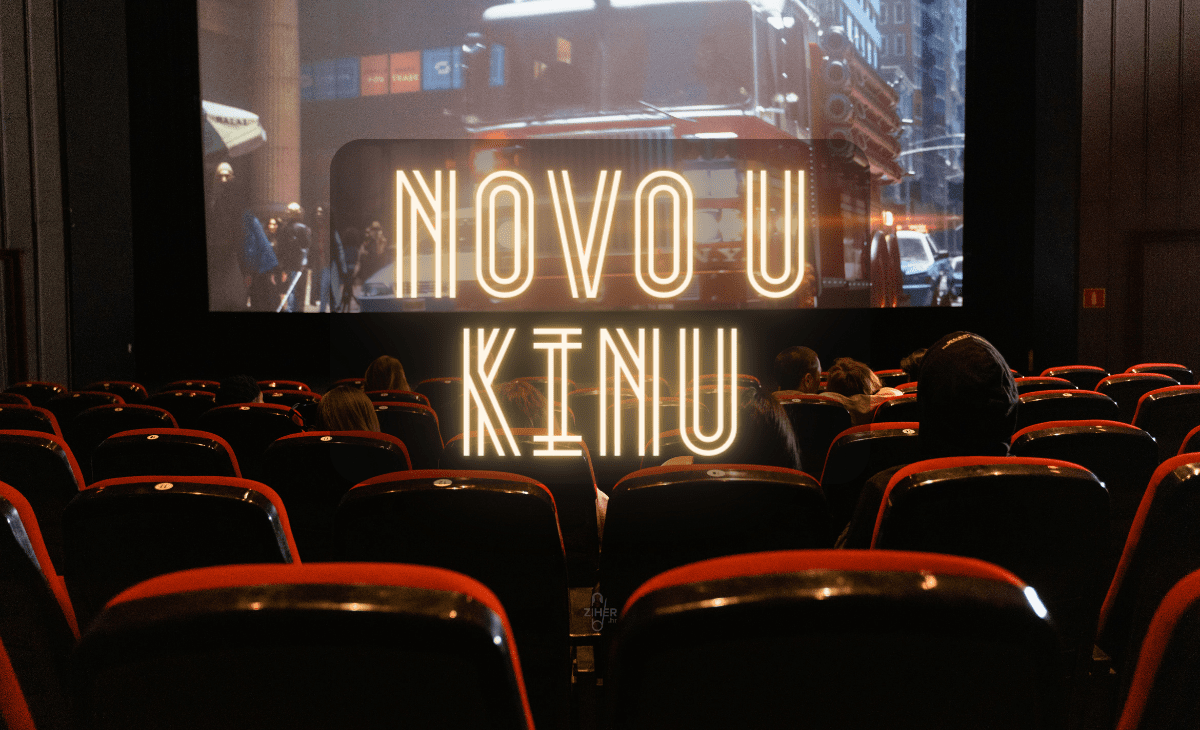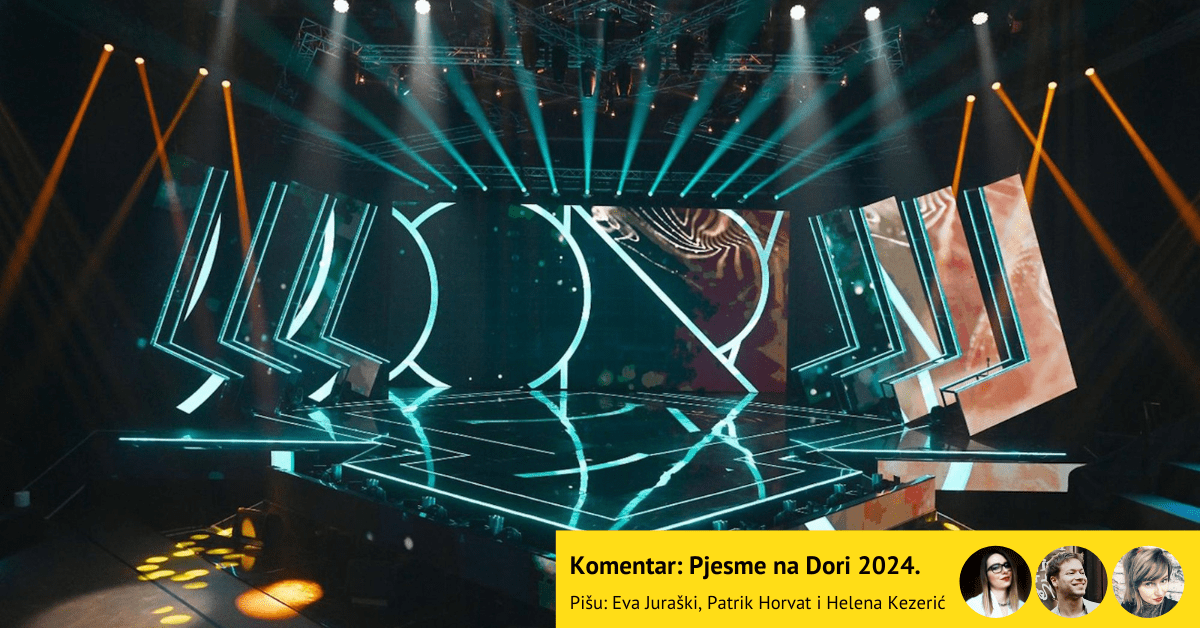Mlada nada mađarskog filma Roland Ferge: “Oduvijek sam osjećao potrebu podijeliti nešto s drugima”
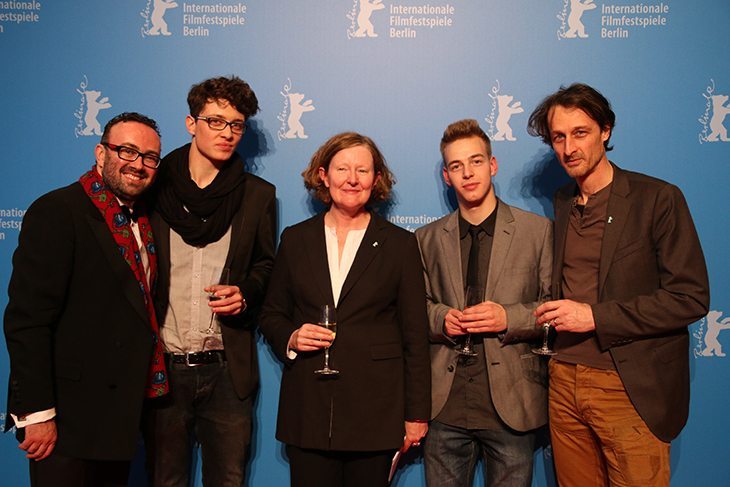
Roland Ferge mlada je nada mađarskog filma. Rođen 1991. u Debrecenu, bavi se filmom i fotografijom. Na BFK-u u Budimpešti završio je studij filma i medija. Sa suptilnim minimalističkim pristupom, filmovi mu se bave širokim spektrom tema odgovarajući pritom na probleme s kojima se susrećemo svi, pa tako i autor. Njegov film Away, čiji trailer možete naći u članku, bio je u prošlogodišnjoj konkurenciji za Kristalnog medvjeda na Berlinskom filmskom festivalu gdje je dobio Special mention međunarodnog žirija.
Kako je bilo na Berlinaleu, što je sljedeće za njega te usporedbu određenih segmenata hrvatskog i mađarskog filma, možete pronaći u daljnjem tekstu.
Roland Ferge is a young and talented Hungarian director. Born in 1991 in Debrecen, he makes films, photos and media art. Two years ago, he got his BA in Film and Media Studies at BFK (University of Applied Sciences, Budapest). With a subtle minimalistic approach, his films are approaching different topics and problems we’re all dealing with, including the author. His film Away (trailer below) was a part of the Berlin Film Festival’s official selection in the Crystal Bear category where it got Special mention from the international jury.
If you’re interested in his success at Berlinale, you are wondering what his plans are for the next film and you are interested in comparison between some segments of Croatian and Hungarian film, you can find his answers below.
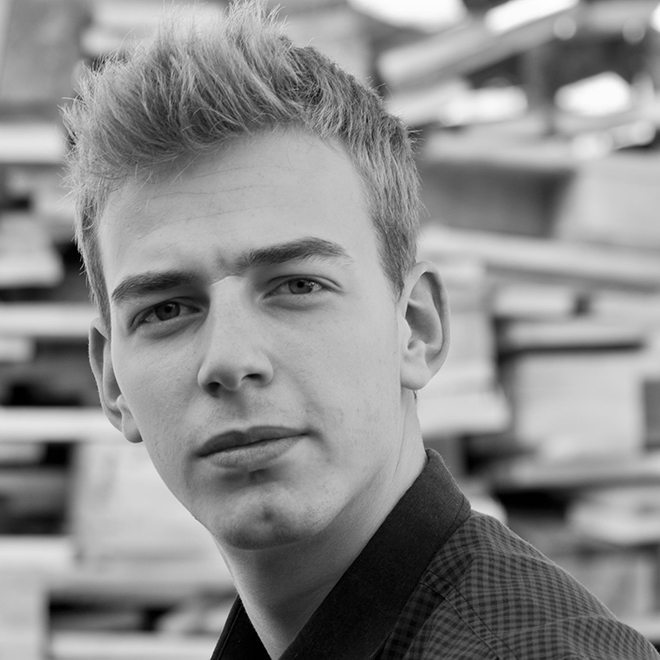
Što je Away (2013.) i kako si došao do ideje za film?
Away je moj diplomski film snimljen u travnju 2013. u mom rodnom mjestu. Bio sam inspiriran temom emigracije jer su mnogi moji prijatelji odlučili otići iz Mađarske i preseliti se u zapadnu Europu u potrazi za boljim životom. Tako da sam bio uključen u temu zahvaljujući njima, pa čak i u raspoloženje, odnosno dilemu “ostati ili otići”… U to vrijeme atmosfera je zbilja bila inspirativna za stvaranje filma.
What is Away (2013.) and how did you come up with that idea?
Away is my graduation film which was made in my hometown in the April of 2013. I was influenced by the theme of emigration because during that time a lot of my friends decided to leave Hungary and move to Western Europe hoping for a better life. So I was really involved in this topic thanks to my friends and the prevailing “stay or leave” mood… That time and that mood really inspired me to make a movie.
Tvoj je film bio dio službene selekcije Berlinskog filmskog festivala i natjecao se u kategoriji Kristalnog medvjeda. Kakav je bio put filma do Berlinalea? Bi li to opisao kao iskustvo koje je imalo utjecaja na razvoj tebe kao redatelja?
Osjećao sam se počašćeno kada je Away bio izabran za 64. Berlinale. Bila je to velika stvar – studentski film će ići na Berlinski filmski festival. Nitko nije pomislio da možemo osvojiti nagradu, čak niti ja, stoga je završna ceremonija bila veliko iznenađenje jer smo dobili Special mention međunarodnog žirija: “Elegantna i formalna umjetnička vizija koja rezonira značenje izvan okvira filma. Vizualna pjesma! “
Oduvijek sam osjećao potrebu podijeliti nešto s drugima. Volim kreirati svoje vizije, volim način pričanja priče slikama.
Your film was a part of the Berlin Film Festival’s official selection in the Crystal Bear category. How did your film end up at Berlinale? Would you describe it as an experience that helped you grow as a filmmaker?
It was quite honored that my film Away was selected for 64th Berlinale. That was a big thing – a college student film will go to the Berlin Film Festival. And no one thought that we could get an award, not even me, so the closing ceremony was a great surprise because we got a Special mention from the International Jury: “An elegant and formal artistic vision that resonates meaning beyond the seams of the film. A visual poem! “
I’ve always felt like I have something to share with others. I like to create my own visions, and I like to tell stories with pictures.
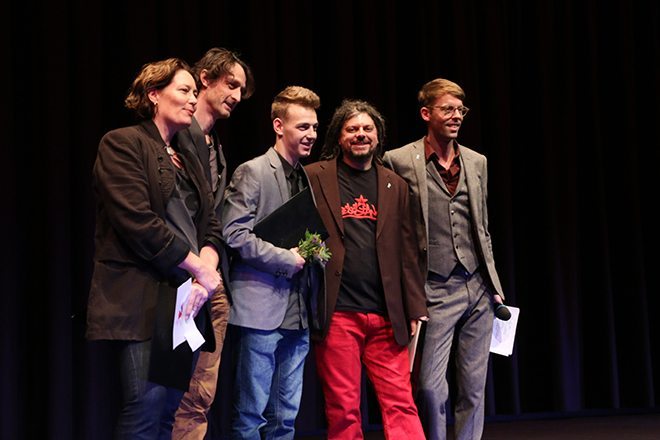
Film nema dijaloga niti boje što pridodaje postignutoj atmosferi. Možeš li nam reći zašto si se odlučio baš na crno-bijelu tehniku? Je li to bilo nešto što si planirao učiniti ili je došlo spontano?
Imao sam mnogo sastanaka sa svojim direktorom fotografije Ákosom K. Kovácsom, pričali smo puno o atmosferi filma i skupio sam na tisuće slika kako bi opisali osjećaj kojim će film biti prožet. Većina spomenutih slika je bila crno-bijela i nakon dotičnih sastanaka film je zauvijek ostao crno-bijel u mojoj glavi stoga nikad nisam niti osjetio potrebu da ga zamišljam u boji. Bio je to dug proces. Unaprijed smo isplanirali što smo više stvari mogli – biranje lokacija i likova, kostimografija… No u jednom smo trenutku morali izabrati novu lokaciju zbog poplave koja se dogodila dan prije snimanja.
There is neither dialogue nor colour in the film which really enriches the film’s vibe. Can you tell us why did you decide to use b/w technique? Was it something you planned to do or did it come spontaneously?
Well, I had a lot of meetings with my DOP Ákos K. Kovács, we talked a lot about the film’s atmosphere and I collected thousands of photos trying to describe the film’s vibe. Most of the pictures were b/w and after these meetings, the film in my head was always b/w so I never felt the need to imagine the film in colour. It was a long process and we pre-planned as many things as we could – choosing locations and characters, costume design… But at one point we had to choose a new location because of the flooding that happened the day before we were supposed to start filming.
Bila je poplava dan prije snimanja?! Kako ste uspjeli snimati s obzirom na novonastale vremenske neprilike?
Dan prije snimanja scene na poplavljenoj lokaciji, završili smo ranije pa smo direktor fotografije i ja odlučili posjetiti poplavljeno područje kako bi provjerili koliko je loša situacija. S obzirom na to da smo čuli samo od mještana kako mjesto izgleda i da se sve dogodilo poprilično brzo željeli smo sami provjeriti stanje. Cesta koju smo izabrali za film bila je potpuno potopljena stoga nismo mogli snimati tamo. Pitao sam svog oca (location manager) koji je dobro poznavao područje da mi ponudi što sličnije mjesto gdje možemo snimiti scenu vožnje biciklom bez prometa. Nekoliko minuta prije sumraka konačno smo pronašli lokaciju.
There was a flood the day before you started to shoot the movie?! What was that like and how did you manage to continue filiming when that unfortunate event happened?
One day we finished the shooting earlier, so my DOP and I decided to visit the flooded area to check how bad the situation was because we only heard from other people how it looked like. It happened quickly, so we had to see it for ourselves. The road which we chose for the movie was totally under water so we could not manage to film a biking scene there. I asked my father (location manager) who knew this area well to find me a similar location as soon as possible. A place where we could make the biking scene without traffic. Just before the sunset, we finally found it, and that was a big relief.

Film prikazuje likove djece u stanju beznađa koji napuštaju svoje domove i odlaze. U Hrvatskoj često govorimo o odljevu mozgova, dijeli li i Mađarska slične probleme?
Da, mislim da je Mađarska u istim cipelama kao i Hrvatska. Ljudi ne žele živjeti u beznađu – mislim, tko želi?
Film depicts kids leaving their homes in a state of hopelessness. In Croatia we talk a lot about brain drain; more and more educated people are leaving their homeland. Is Hungary having similar problems?
Yes, I think Hungary is in the same boat as Croatia. People do not want to live in hopelessness – I mean who would want that…
Kakvi su uvjeti u Mađarskoj za mlade redatelje poput tebe? Je li teško doći do budžeta za financiranje projekta i kako vidiš budućnost filma u Mađarskoj?
Sistem financiranja se promijenio prije nekoliko godina. Za mlade redatelje nije lako [doći do budžeta] ali konačno je započet program koji bi trebao pomoći posebno njima. Problem nastaje ako prihvatite novac – morate primati njihove sugestije inače ništa od novca. Isto tako, nemate slobodu napraviti „final cut“ sami. Mislim da to nije idealan sistem jer žele kontrolirati svaki aspekt stvaranja filma, a to može ubiti umjetnost. Ja želim raditi umjetnička djela čak i ako ne zarade novac.
What’s it like in Hungary for a young director like you? Is it difficult to get a budget for financing a project and how do you see the future of the film in Hungary? What are your expectations?
The financing system changed a few years ago. It’s not easy when you’re a young director, but there is a new program that is aimed at helping young directors. The problem is – if you accept the money, they can ask you to make changes in the movie and you have to listen to them, otherwise you don’t get any money. Also, you’re not allowed to make the final cut. So I think it’s not an ideal system for making films because they want to control every part of the process and that can kill the art. I want to make art even if it doesn’t earn me any money.
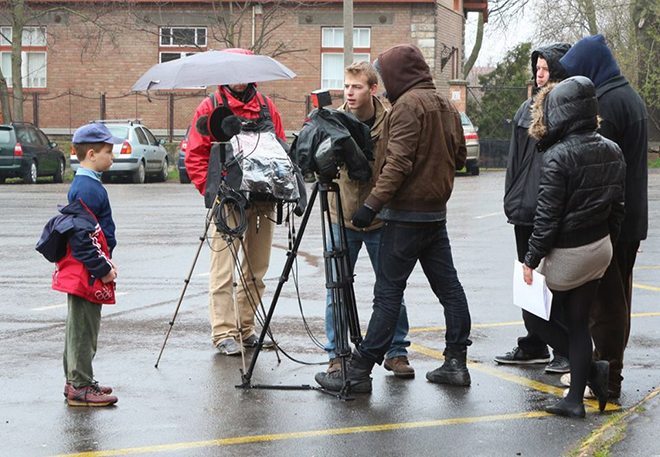
Ovdje se često susrećemo s manjkom interesa za domaći film. Kakva je situacija s Mađarskim filmom i imaju li domaći filmovi publiku?
Nažalost mađarska je publika nekako nezadovoljna mađarskim filmom. Većina misli da su ti filmovi preartistički jer ih ne mogu razumjeti. Mislim, problem je u tom što ljudi žele plitko instant iskustvo kao što su Hollywoodski filmovi – ne žele razmišljati previše. Možda mogu reći da su određene promjene počele zahvaljujući mađarskim filmovima poput White God ili Son of Saul koji su bili uspješni u inozemstvu. Teško je pričati o pravoj publici, ali nadam se da će se sve više i više ljudi odlučiti za mađarske filmove u kinima.
We are faced with people’s lack of interest for Croatian films. What’s the situation with Hungarian film? Do they have an audience?
Unfortunately, Hungarian audience is disappointed by Hungarian films. Most of them think Hungarian films are too artistic to watch because they do not understand them. I mean, the problem is that people only want a shallow and instant experience that they get from the Hollywood movies – they do not want to think too much…
Things have changed a bit thanks to the Hungarian films like White God or Son of Saul that achieved foreign success. It’s hard to speak about real audience but I hope more and more people will choose to watch Hungarian films in the cinema…
Pratiš li regionalne filmove i jesi li ikad bio na nekome od brojnih festivala u Hrvatskoj?
Uglavnom pratim ali ove sam godine većinu vremena utrošio doma pokušavajući se pripremiti za sljedeći film.
Što se festivala tiče nisam još, ali bi definitivno volio otići i posjetiti neke od njih.
Do you watch regional films? Have you ever been to any of Croatia’s numerous film festivals?
Most of the time I do, but this year I spent most of my time at home trying to prepare for my next film.
Not yet but I would definitely like to go and visit some of them.
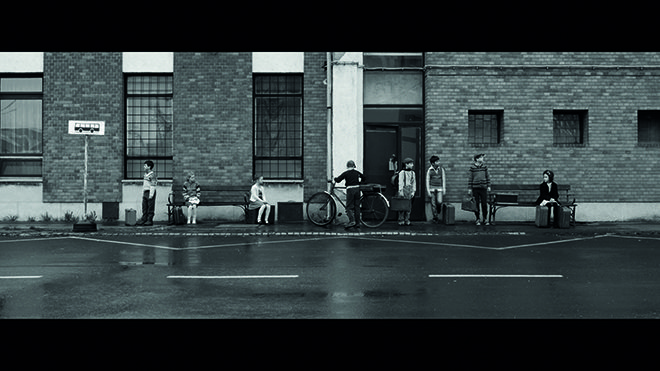
Možeš li nam reći radiš li trenutno na određenom projektu i što je sljedeće za tebe?
Da. Još uvijek radim na nekoliko ideja za kratki film i teško je odlučiti koja bi bila idealna za sljedeći film.
Mogu podijeliti neke detalje: ostat ću na selu, neće biti dijaloga, čudni likovi i novo filmsko iskustvo kreirano vizijom.
Are you working on something new? Can you tell us what’s next for you?
Yes. I am still working on several short film ideas and it’s hard to decide which idea could be great for the next film.
I can share some details. The plot will happen at the countryside, there will be no dialogue, the characters will be strange and it will be a new kind of film experience that’s going to be created according to my vision.


